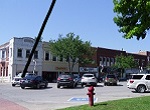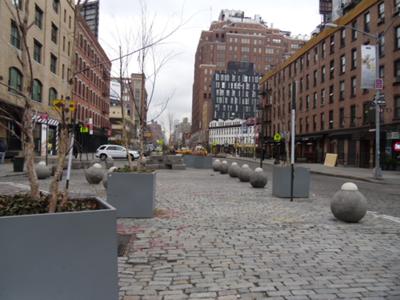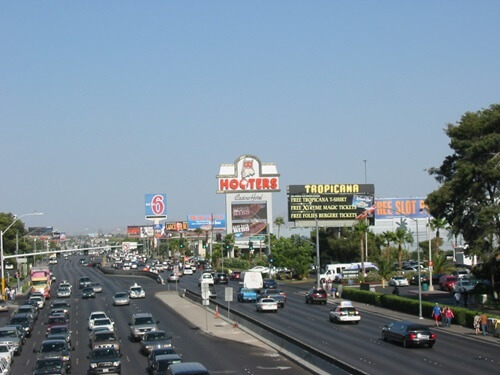Will the Benefits of a Business Improvement District Make the Assessment Worth It?
Published: July 2, 2024
On this page I will walk you through the potential benefits of a business improvement district and give you some criteria by which to judge whether you as a business or commercial property owner want to be a part of initiating the special assessment tax that would be collected by such a district. I have served as a city's staff liaison to several such districts and can offer some experiences about what they do well--and not so well.
If you have not heard of this concept, a business improvement district (BID) allows business owners and commercial or industrial property owners to create a special taxing district that collects revenue to spend on extra safety or crime-fighting measures, physical improvements to the public realm and streetscape of the district, marketing and advertising, landscaping and beautification features, and sometimes more.
 Van belonging to a downtown business taxing district cruises the area looking for problems and tourists or residents in need to help.
Van belonging to a downtown business taxing district cruises the area looking for problems and tourists or residents in need to help.The rules for initiating this type of taxing district are established by each state government in the U.S. The concept is widely used in North America and Europe as well.
You may find that in your state, these are called a business improvement area or a special business district. Some business areas may find that they fall under a neighborhood improvement or community improvement district law in their state, and that there is no practical advantage or disadvantage to organizing themselves under a business improvement district statute.
Regardless of state variations, there are a few common elements in the business improvement district concept:
- First, realize that the business improvement district property owners ultimately vote to impose a tax on themselves, one not paid by the rest of the city. I was a little dismayed recently to see that someone on a public commission thought that the business improvement districts were handed out at will by the local government as favored emphasis areas. This person did not realize an extra tax was involved.
- The process of creating the district usually is initiated by petition of business or commercial property owners in the impacted area, although in some cases, the local government may be allowed to start the process.
- Often a majority of the property owners must sign the petition, and usually the owners of more than a majority of the assessed valuation of the proposed district must sign also. This is to protect against a few owners of smaller parcels imposing a tax on one or two unwilling large property owners.
- Usually the property owners must vote after the petition has been certified as adequate.
- A public hearing may or may not be involved, but at a minimum, all property owners of record must be notified of the proposal.
- Typically the local government collects the special assessment in the same manner that it collects all other taxes, making non-compliance rather rare. Often the local government writes the checks too.
- In most states, a clear majority of the land area must be zoned for commercial, retail, or industrial use; some states require that all the included land be zoned commercial already. Usually if some of the subject property is still in residential use, as long as the zoning is commercial, that counts. Almost always the district must consist of contiguous properties, although predominantly hotel districts seem to be an exception.
Next I will explore the benefits of a business improvement district, and then the page will close with a few caveats or potential disadvantages.
Benefits of a Business Improvement District
The concept of businesses taxing themselves to provide extra goods or services that a local government does not provide, either because it cannot afford that same level of service all over town or because it is restricted by law from carrying out activities such as advertising and promotion, is quite appealing.
Here I will list some benefits that I personally have seen businesses in a community improvement district receive:
- Funding for a consultant to create a slogan and a promotional campaign for a business district
- Hiring of a professional manager (see our answer to a website visitor's question about whether a business district manager should help an individual business)
- Hiring of a management company that handles matters such as garbage pickup and planter box maintenance
- An annual landscaping program encompassing both planting beds and hanging baskets
- Purchase of new planters for use by each business at their door
- Extra patrols by off-duty police officers
- Security cameras mounted throughout the district
- Reward for information about a series of car break-ins in parking lots
- Construction of an addition to a parking lot
- Special events, including festivals, concerts, fashion shows, parades, charity softball games, midnight sales, and much more
- Constructing a gazebo in a small open space in an intersection
- New benches throughout the district
- Repairs to a poorly functioning drinking fountain
- Pair of new public sculptures (see our page about establishing a theme for public art)
- Bollards to close off vehicular traffic in an area without restricting bicycles and pedestrians
- Bicycle racks
- Bicycle lane markings
- Concrete checkerboard
- New ornamental street signs
- Uniform awnings
- Development of local design guidelines by a consultant
- Canvas shade structures in a plaza
- Replacement street trees and expansion of a street tree program into a new area
- Curb extensions to make pedestrian crossings more friendly
- Large display ads in a suburban newspaper
- Prizes for a contest for a new advertising slogan
- New street banners
- Professional videos
- Listing in a directory
- Television informercial
- Speed bumps
- Compensating the city government for loss of revenue when parking meters were removed in the district
Of course, it is possible that with an ideal political campaign, the business districts in question might have coaxed the city government itself to pay for some of these improvements. However, cities are increasingly wary of making questionable purchases that other business districts would be certain to challenge in a public, embarrassing way.
Why a Special Taxing District May Not Be Desirable
In spite of all of the benefits of a business or community improvement district, it is worth slowing down a rush to create such a district to ask a few good questions.
The most obvious possible disadvantage of all is plain to see. Will the amount of benefit exceed the direct financial cost? Suppose that business owners, many of whom are tenants, think that the benefits are obvious, while the property owners themselves do not feel that the improved business climate will directly translate into higher lease payments, since the leases themselves often run for several or many more years. In most states, it is the property owner that pays the bill, so if most businesses are tenants, there will be a divergence of interest between the property owner and the business owner.
In some circumstances, a safer, cleaner, or prettier business district will not necessarily lead to more merchant prosperity. This would be true in neighborhoods that have so much disinvestment that people do not want to walk or drive through them unnecessarily. Or maybe the business types are obsolete. If you have a high percentage of the likes of typewriter stores or microwave repair places, no amount of flower boxes may not make sales soar to 1980s levels.
Industrial areas that have been hollowed out by globalization will not suddenly become more profitable if the remaining property owners tax themselves to install landscape medians.
Yet another consideration is how businesses will feel about the formal or informal control over expenditures that the local government will be able to exert. If the local government has some authority in your state, consider possible resentment from merchants and property owners who have to pay increased taxes but still cannot do exactly as they wish. I personally have witnessed some degree of businessperson dissatisfaction because the city government would refuse to write a check for some purchase that the BID advisory committee had approved.
Another complication stems from the nature of commercial leases. Often a lease that is in place when the district is established will not allow the property owner to raise the rent during the lease term due to new amenities in the business district. In that case, the property owner may reason that they are unlikely to see the business benefit for a number of years.
These thoughts may provide some clues as you deliberate carefully about whether you want to petition for or vote for a business improvement district.
Read More Pages Relevant to Commercial Districts
- Community Development ›
- Community Challenges, Common Topics & Concepts ›
- Economic Development > Benefits of a Business Improvement District
Join GOOD COMMUNITY PLUS, which provides you monthly with short features or tips about timely topics for neighborhoods, towns and cities, community organizations, and rural or small town environments. Unsubscribe any time. Give it a try.





